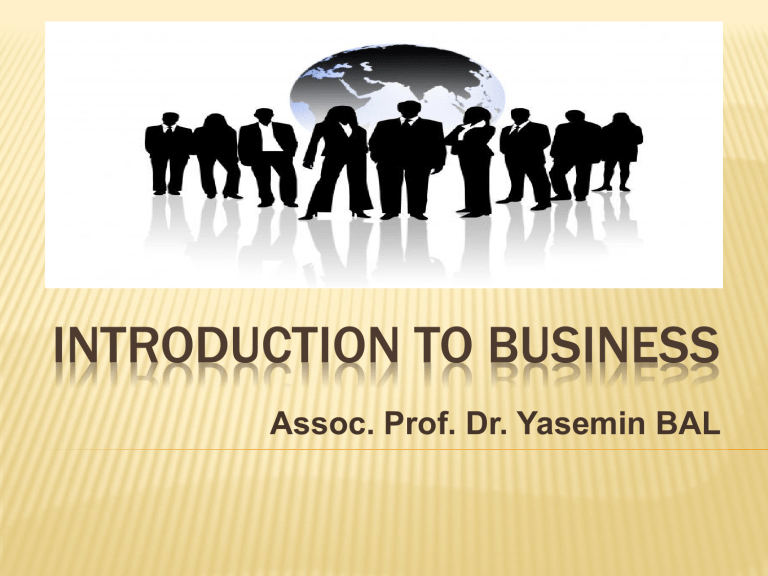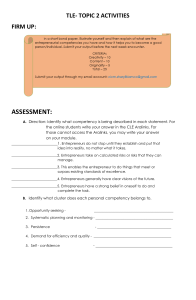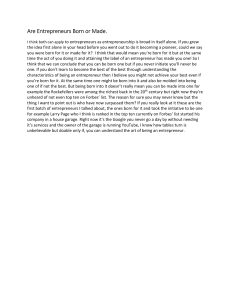
INTRODUCTION TO BUSINESS Assoc. Prof. Dr. Yasemin BAL CHAPTER 1: BUSINESS WHAT IS BUSINESS? Business is related with delivering goods or services to the community. Business includes managing sources. Business can be done for basic purposes; to make profit and to make money. Business can be done solely to serve the public without thinking about profit and making money. WHAT IS BUSINESS? Business consists of all activities to serve goods and services to the community sometimes with the purpose of profit to make money for surviving and sometimes for primary objectives other than profits. The primary activity of business is the exchange between buyers and sellers. WHAT IS BUSINESS? Business should be defined as an activity, which provides society (or others) needed goods and services at a profit. Why do people buy and sell? WHAT IS BUSINESS? They do it to satisfy their existing needs and wants. But that exchange should be continued because even an already satisfied need or want should be re-satisfied over a period of time. So business is a neverending process. Therefore in every community big or small, business will always take place between its members. What are the things or products that are subject to exchange ? The goods that are produced could be tangible such as bread, computers, cars, buildings etc. Some businesses provide services such as healthcare, insurance, entertainment, cleaning, transportation etc. Services are intangible products. PRODUCTS Goods and services are commonly called products in business life. PROFIT For many people, business is a profit-seeking activitiy. Profits serve as the incentive for business people to start and operate a business. Profit is an expectation when doing a business. PROFITS When business people combine their resources (labor, technology, knowledge, capital), they pay for these and they expect more than they spend in the creation of goods and services. The difference between the revenues collected for those goods or services and payments to create is considered the reward and this is called profit in business life. ORGANIZATIONS Organizations in business are any deliberately established groups of people working together in a systematic manner for a common purpose such as companies, corporations, associations, units or unions. ORGANIZATIONS Most of the organizations are set to get profit by serving the necessary products in society. These profit-seeking organizations are the main group in business life. However there are many other organizations set to do business for their own primary purposes other than making money or making profit. These organizations are called non-profit organizations. Government agencies, labor unions or various institutions established in the form of foundations to serve the public. They have their revenues to cover all or part of their expenditures. Their basic purpose is to serve community. BUSINESS TODAY Information technology Management practices Elimination of barriers for free trade in the world. BUSINESS TODAY ENTREPRENEURS: BUSINESS PEOPLE WHO START BUSINESS Business owes much to the entrepreneurs. Without them business could not be formed. Entrepreneurs are business people who take risks and form businesses to provide goods and services that the community needs while at the same time earning profit as their reward. ENTREPRENEURS: BUSINESS PEOPLE WHO START BUSINESS Entrepreneurs first notice an opportunity in an industry. Innovative Create new products, styles, techniques and processes. Bring the resources together. Create new job opportunities. CHARACTERISTICS OF ENTREPRENEURS: MANAGERS: BUSINESS PEOPLE WHO MANAGE THE BUSINESSES The owners of the company set the objectives to be accomplished. Then they select a person who will combine all the company’s resources to attain these goals. A manager is a person who combines all these resources (tangible and/or intangible) for accomplishing the tasks. MANAGERS: BUSINESS PEOPLE WHO MANAGE THE BUSINESSES There are two important issues that a manager should consider: the resources to be employed the tasks to be completed Task completion is the primary responsibility of all managers. They do not usually get involved directly in performing these tasks. They lead people to do the things. MANAGERIAL FUNCTIONS Planning Organizing Leading Controlling MANAGEMENT LEVELS MANAGERS AND REQUIRED SKILLS Managers are the ones who accomplish the tasks by other people in an effective and efficient way by utilizing the 4 function (planning, organizing, leading and controlling) of management. Their job is very complex and requires a range of skills. MANAGERS AND REQUIRED SKILLS CONCEPTUAL SKILL: It is an ability to see the organization as a whole with its interrelated and independent parts, departments and divisions within the context of its industry and the general environment. This managerial skill requires a good mission identification, strategic thinking, strategy formulation and an ability to create vision. MANAGERS AND REQUIRED SKILLS HUMAN SKILL: It relates to the manager’s ability to work with people. This skill is equally important for the all management levels and should be present in all managers in the organizational hierarchy. A manager’s success in motivating, communicating, coordinating and resolving conflicts between employees is dependent on this skill. MANAGERS AND REQUIRED SKILLS TECHNICAL SKILL: It is the ability of managers to perform specific tasks. This skill includes a mastery of methods, techniques and equipment involved in functions. In the lower management level, this skill is very important for performing tasks. MANAGERS AND REQUIRED SKILLS MANAGER ROLES MANAGER ROLES Informational Roles: This role pertains to managers collecting and disseminating information necessary in performing managerial functions. They monitor the necessary information from many sources and then disseminate this information to other interested parties. They also act as spokesperson to make announcements. MANAGER ROLES Interpersonal Roles: Performing their duties, managers are also involved in interpersonal relations with others in or out of the company. They act as figureheads and present their company to public. They also act as leaders to their subordinates and direct them in their tasks. Managers link people and act as a liaison pin between them. MANAGER ROLES Decisional Roles: Managers always make decisions in performing their tasks. This is the most important and primary duty of managers. They sometimes create new businesses when they see new opportunities around. This is their entrepreneur role in the company. Many conflicts occur within or out of the company. One important role of managers is the disturbance handler role. They resolve numereous small or big problems. MANAGER ROLES Decisional Roles: One important decisional role relates to managers’ role as a resource allocator. The scarce respurces are allocated by the managers in organizations. Also, managers are always involved in negotiating with others and this is called negotiator role. HOMEWORK-1 Find examples of entrepreneurs and explain one of them. Life of the entrepreneur Business Success Failure



